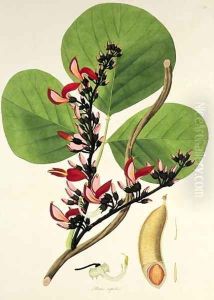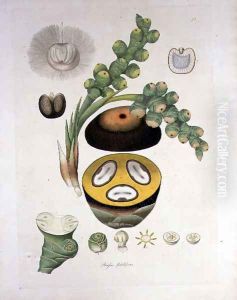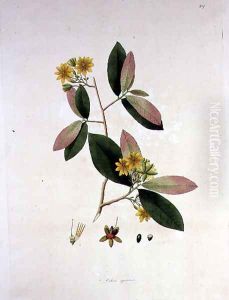William Roxburgh Paintings
William Roxburgh is not primarily known as an artist but rather as a Scottish surgeon and botanist, often referred to as the 'Father of Indian Botany.' Born on June 29, 1751, in Underwood, Scotland, Roxburgh showed early interest in plants and natural history. He studied medicine at the University of Edinburgh, and after completing his studies, he joined the East India Company as an assistant surgeon.
Roxburgh arrived in Madras (now Chennai), India, in 1776 and began to work at the Samalkot hospital in the Northern Circars. His passion for botany flourished in the richly biodiverse subcontinent. He was later appointed as the superintendent of the Samalkot garden. His work gathered so much recognition that in 1793, after the death of the pioneering botanist Johann Koenig, Roxburgh took over as the superintendent of the famous botanical garden in Calcutta (now Kolkata), one of the oldest botanical gardens in the world.
During his tenure in India, Roxburgh conducted extensive studies of the Indian flora, documenting numerous species for the first time. He sent many specimens and drawings back to Britain, which contributed significantly to the understanding of Indian botanical life. His contributions to botany are vital, with several plant species named in his honor, including the genus Roxburghia. He was also instrumental in introducing several economically important plants to India, including mahogany and teak.
Roxburgh's major works include 'Flora Indica' or 'Descriptions of Indian Plants,' which was published posthumously. His contributions extended beyond botany to meteorology and agriculture. Despite his primary role as a botanist, the detailed botanical illustrations produced under his supervision are considered significant contributions to scientific art. They were often created by Indian artists under his direction, combining scientific precision with aesthetic appeal. After retiring in 1813, he continued his research but passed away on April 10, 1815, in Edinburgh. William Roxburgh's work laid the foundations for future botanical and natural history studies in India and had a lasting impact on the fields of botany and horticulture.


